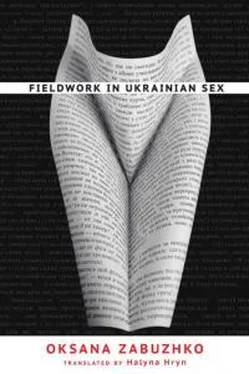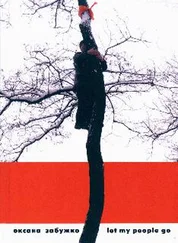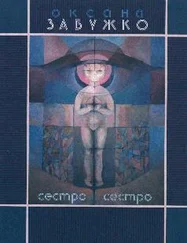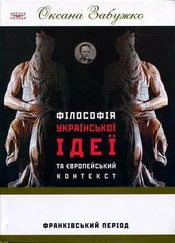Оксана Забужко - Fieldwork in Ukrainian Sex
Здесь есть возможность читать онлайн «Оксана Забужко - Fieldwork in Ukrainian Sex» весь текст электронной книги совершенно бесплатно (целиком полную версию без сокращений). В некоторых случаях можно слушать аудио, скачать через торрент в формате fb2 и присутствует краткое содержание. Город: Las Vegas, Год выпуска: 2011, ISBN: 2011, Издательство: AmazonCrossing, Жанр: Современная проза, на английском языке. Описание произведения, (предисловие) а так же отзывы посетителей доступны на портале библиотеки ЛибКат.
- Название:Fieldwork in Ukrainian Sex
- Автор:
- Издательство:AmazonCrossing
- Жанр:
- Год:2011
- Город:Las Vegas
- ISBN:978-1-61109-008-6
- Рейтинг книги:5 / 5. Голосов: 1
-
Избранное:Добавить в избранное
- Отзывы:
-
Ваша оценка:
- 100
- 1
- 2
- 3
- 4
- 5
Fieldwork in Ukrainian Sex: краткое содержание, описание и аннотация
Предлагаем к чтению аннотацию, описание, краткое содержание или предисловие (зависит от того, что написал сам автор книги «Fieldwork in Ukrainian Sex»). Если вы не нашли необходимую информацию о книге — напишите в комментариях, мы постараемся отыскать её.
Fieldwork in Ukrainian Sex — читать онлайн бесплатно полную книгу (весь текст) целиком
Ниже представлен текст книги, разбитый по страницам. Система сохранения места последней прочитанной страницы, позволяет с удобством читать онлайн бесплатно книгу «Fieldwork in Ukrainian Sex», без необходимости каждый раз заново искать на чём Вы остановились. Поставьте закладку, и сможете в любой момент перейти на страницу, на которой закончили чтение.
Интервал:
Закладка:
Fear came early. Fear was passed on in the genes, one was to fear all beyond the immediate family circle—anyone who expressed any degree of interest in you was in fact spying for the KGB to find out what’s really going on at home and then those bad men will come again and put Daddy in prison. Especially suspect were those who tried to strike up “liberal” conversations. Around ninth grade, at the citywide Creative Writing Olympiad she met a whiz kid in big glasses from the math school. He had the skin of a freshly-peeled peach, rare for an adolescent, and glancing at him sideways she could see, behind the abnormally thick lenses, dark feminine eyelashes as thick as silk; and when he laughed, his whole body contracted as often happens with very nervous intellectual boys who aren’t allowed to go out to play by themselves, but are let out only when sitting on a sled bundled up in a wool shawl to well above the bridge of the nose. Such boys inevitably fell in love with her, that much couldn’t be helped, but in spite of it they were avid readers and liked to discuss what they read. And so one day the whiz kid from the math school, holding on to her elbow awkwardly and old-fashionedly (as if with an artificial limb) while he guided her around the slippery spots—it was winter then and the snow-covered sidewalks glistened with treacherous black mirrors—had the indiscretion to ask, by the way, had she read the banned Ukrainian author Vynnychenko? Instantly she felt her head pound: This is it! This is what Mother and Father warned about—and with that shrewd Lenin glint in her eye (she did sense it quite consciously to be Lenin’s), accompanied by oh, such a languorous pause as if to say, okay, let’s play with this, I can see right through you, she replied, “No, can’t say that I have,” and, having waited it out until the whiz kid confessed all he knew—about the democratic Ukrainian republic that waged war on the Soviets, about the Ukrainians living abroad (as she listened, practically swooning at such flirtation with danger, she no longer had the slightest doubt who this was talking to her)—she doused him with a bucket of ice, tapping out each syllable in precise Pioneer Girl fashion (“Attention!” “Right face!” “Forward… march!”) informing him that she hadn’t the slightest interest in émigré counterrevolutionary trash, and at a time when the international situation is as tense and complicated as it is and demands our vigilance, she has always been outraged by young people who listen to Voice-of-this and Voice-of-that radio broadcasts—he, staring wildly at her with both pairs of eyes seemed to forget all about breathing (“Little hedgehog, where was your head? Forgot to breathe, and now you’re dead!”)—that’ll teach him! She was more pleased with herself than ever before: her first test of maturity and she passed it without a hitch! No, she had always said she would never want to relive her adolescence—those desperate, unconscious attempts to break out —out of the dull concrete walls, out of the family nest choked inside, amid billows of pungent fear, miasmic haze, where one false move, one ill-considered revelation, and you splash into the murky waters to your death. On the radio that Father listened to every evening, squeezing ear-first into the speaker that sputtered with a deafening scrape and occasionally burst into a sharp, dangerously increasing metallic whistle—on the radio came memoirs of the dying Snegirov, lists of surgically removed intestines, ruptured kidneys and bladders, insulin shocks, forcibly inserted feeding tubes, puddles of blood and vomit on cement floors—summary reports from the slaughterhouse, a carving of carcasses: Marchenko, Stus, Popadiuk, every few weeks more names, young and handsome, youths not much older than yourself with thick manes of hair brushed back stiffly, you dreamed of them the way your girlfriends dreamed of movie stars, any day now he’ll come out of prison bearing scars and a mature masculinity, and you’ll meet—except that they never came out and the airwaves groaned with their agony, while Father sat on the other side listening helplessly, year after year, ever since the day he himself was thrown out of work, just sat in the house and listened to the radio. There was no breaking out—all around nothing but Communist Youth League meetings, political education classes, and the Russian language. One only ventured out there (like a four-year-old to a stool in the middle of the room to recite a poem for aunties and uncles) in order to reproduce, in ringing tones and tape-recorder accuracy, all that had been learned from them and them alone ,and only this guaranteed safety —a Gold Medal on leaving high school, a Diploma of Red Distinction at university, and then ever so carefully along the tightrope—my God, all the garbage she had let pass through her brain!—and at age fifteen tumbling right into a depression, complaining of mysterious stomach pains, Daddy ran himself off his feet dragging her from doctor to doctor who found nothing wrong, for days she tossed in bed crying hysterically from the slightest sharp word—Daddy’s girl, apple of his eye, it was he who hovered, wings outstretched, over her first menstruation, calmly explaining that this is very good, this is what happens to all girls, just lie and rest, don’t get up. He brought her thinly sliced apples laid out on a saucer, like for a real sick girl, and so she lay there, curled up and very still, frightened by this new feeling—on the one hand shame at her secret being revealed so openly (but then how can you have secrets from Daddy?) and, on the other, a kind of searing vulnerability, a wary uncertainty—a feeling that would reappear at the loss of virginity (which she only manages after Daddy’s death), and then every time after that, the same eternal sense of daughterly duty, ultimate feminine submission from which men, not having a clue of its source, would necessarily go wild (“ You’re such a good fuck! ”) and then she would leave them. Break loose, that’s all she wanted to do, break loose—all elbows from spontaneous adolescent growth, pimply teenager in tears at her own awkwardness, one pair of panty hose speckled with brown knots where she tried to sew up the runs, and one dress, the school uniform worn lily-white at the elbows. She went to school dances religiously—every Friday without fail, like a Moslem to the mosque!—in a borrowed blouse and too-short skirt from her Pioneer Girl days (white top, black bottom), consuming herself with bitter envy at the sight of her classmates in all-grown-up clothes, with grown-up haircuts done at the stylist’s, in full bloom like the proverbial cherry orchard, glistening in high-gloss lipstick and black Lancôme butterfly lashes—ten roubles was what that blue tube of mascara cost, and Mother’s monthly paycheck, on which the three of them lived, came out to 150 roubles, so what was there to do but steal it, in the coatroom, from a briefcase thoughtlessly left open by a beauty queen from the senior class—true, it was a pretty cheap tube, from Poland, half used up, or so she consoled herself, and not such a great loss for the beauty queen, but nonetheless there it was, nineteenth century, the classic Jean Valjean loaf of bread and Cosette staring at the doll-store window: shame, fear, a secret, both despicable and exciting, like her exhibitionist exercises alone in front of the mirror. She applied makeup badly in the school bathroom, painting crooked lines under her eyes, and after the dance she would fiercely scrub the mascara from her red eyelids: it was frightening to think what would happen if Daddy saw—Daddy, who was always so afraid for her, who ran around collecting dossiers on each of her girlfriends: they were all spoiled, smoked, and kissed boys, Daddy screamed, face turning beet-red and she, you have to hand it to her, screamed just as loud in return, and then sobbed in the bathroom—especially after that memorable evening when he slapped her face right out on the street, at the trolley stop, because she had taken off somewhere and he decided that she was running away from him—but she came back, because there was nowhere to run to, and he, not saying a word, slapped her as hard as he could across the face. Of course, later there were hugs-and-kisses, forgiveness-begging and the like, “my baby,” “my golden girl,” all this after several red-hot hours of pandemonium, wailing, sobbing, slamming of doors, accompanied by the shuffle of Mother’s feeble attempts to intervene—because Mother was quite beside the point in all this, Mother was, in fact, frigid, and obviously out of it, a black windowpane deflecting all light (later on, one morning in the early months of your marriage, she would poke her head into your bedroom with an alarm clock ringing merrily in her hands: wakey, wakey, breakfast is ready!—precisely at the moment—and after the ensuing explosive scene she would weep like an orphan in the kitchen, frightened and helpless: she was just trying her best!—so that in the end you, having calmed yourself and shaken the rest of the shivers from your startled body, would be apologizing and cheering her up). And what else could she have been if not frigid, a child-survivor of the Famine (a three-year-old in 1933, she stopped walking, while Grandmother made her way to Moscow in freight cars, switching from train to train, in order to exchange her dowry—two thick strands of Mediterranean pearls—for two bags of dry bread). A child nourished on single stalks of wheat stolen from the field, for which the collective farm guard, catching her once, cut her across the face with a whip—you can still see a thin white thread of a scar even now—and it was lucky to have ended with that, because her father, your grandfather, that is, was already up in the Arctic panning gold in a slave-gang, and about fifteen years later your father, her future husband, would be up there doing the same. And as for her, she made out okay, she got over the stolen ears of wheat and finally got enough to eat, twenty years or so later once she graduated from university and found a job—and American Sovietologists still can’t figure out why there are so many fat, shapeless women in this generation, they read Fromm and Jung up and down and between the lines— Eat , that’s what these babes wanted to do when they hit twenty— eat, that’s all!— stuff their faces with meager bread rations in student dorms, both hands, picking up crumbs, what a clitoris was they never did get to find out (it hit you for the first time standing in line at a pharmacy: they had brought in some menstrual pads, and a queue made up entirely of young women was busily stuffing shopping bags—the grannies, meantime, walked up shyly: “Girls, what’s in those packages?”—“They’re women’s packages, for women!” the girls snarled back: not for the likes of you, in other words—and the grannies stared back blankly, not understanding). So Mother was as innocent as a lamb, or rather the Virgin Mary (there really was something Madonna-like about her in those photos from the late fifties—the time when they all finally did get enough to eat—she glowed with such gentle innocence, a girl in curls, you couldn’t take your eyes off her!—delicate long face with a slim tapered nose—a now lost, quiet kind of beauty illuminated by an inner smile, the Cossack Baroque portrait three hundred years later: Roxolana, Varvara Apostol, Varvara Langyshivna—yup, those were the days, now gone for sure! You still get to see the full-faced, embroidered, fresh-off-the-farm-let’s-go-dance-in-the-cherry-orchard variety, but not the true Cossack ladies, forget about those! And even your own good looks are already by two exponents coarser, more vulgar—let’s not forget to make that were ). And so Mother, gentle songbird, sacrificial lamb, slaved over her dissertation in a Khrushchev communal housing project, while in the kitchen her neighbor, a cook from the local working-class diner—one of those that Lenin had ordained to rule the state—(single mother of five from five different men), threw rags and teeth into Mother’s borsch (baby teeth belonging to one of the progeny, perhaps?). But Mother did finish her dissertation in poetics despite it all, right in time for 1973, when as the spouse of an “unreliable” she was booted the hell out of grad school, so that the day of your dissertation defense (which you needed like a hole in the head) was in fact her day, she was as happy as a child: “Ah, if only your father were alive to see this!”—and how in God’s name, by what means was he supposed to have stayed alive, pitched to the very bottom of the well but catching hold of a beam on the way down in a spasmodic grip and clinging desperately (anything but back to the prison camp), buried alive in four walls, listening to the radio, blowing cigarette smoke out of the tiny pilot window and watching with horror as the only woman of his life, his own flesh and blood, irrevocably slipped away, pushing out through the trap door, propelled by the sheer force of natural growth: “ Lift up your nightie, I want to see how you’ve been growing ” (and would it not be the same kind of both concerned and authoritative intonation twenty years later—“ Turn around, I want to take you from behind now” —that would awaken in you that long-forgotten feeling of home?)—and it won’t matter that you never liked it from behind, it won’t matter that at first you refused to lift up your nightie, flushed with an un-childlike feeling of insult—only to hear in response a quiet and unfamiliarly moist, deeply-felt “my child, it’s me, your Daddy!”—in the end result of which the nightie did indeed go up (what else could you do?)—that anxious, obscene feeling of exposure, the first experience, far stronger than any of that knee-touching under the classroom desk—and yet you yearned to break free, God how you yearned to break free—like a condemned soul from under the executioner’s axe, but—where? To your teenage friends, any dance in sight, rock bands, football games, and the first groping of body parts in the darkness of the school gym—what a joke! You couldn’t even tell any of them how in the third year they finally showed up, your father’s fear came to pass, because fear—it always reifies in the end. They burst inside the four family walls like a tornado with a luscious creak of leather holster belts and a vigorous outdoor wind behind them and suddenly filled the room to capacity: three huge males, rosy-cheeked from the sub-zero temperatures, slapping the covers of their identity cards, “pack up, let’s get going!” Father scurried around looking for papers, sorting something on his desk, hands trembling, stunned and pathetic, and then you jumped out at them from the corner of the room, pimply pale-green adolescence trying to unbend its back—squelched and squeaky, long bangs swinging across your nose, you screeched: “How dare you, what right do you have!” It didn’t come off too well, actually it came off not well at all, the guys shut you up as easily as kicking a puppy aside with one foot (young junior officer, moustache the hint of a thin line was trying real hard, piece of fucking shit on his first responsible assignment—no piddly matter, catching a real-live anti-Soviet!—“not your business, sweetie, you’re a little young for this, aren’t you?”). And anyway, your parents, dark-faced with terror as though someone had slipped Polaroid paper under their skin, began hissing-shushing-flapping long before you even rushed forward. But the first failure didn’t stop you, because it’s true what the man said, you’re a brave woman, that you are, sweetness. Some years later, as a student in the eighties out on a date with the latest cutie-pie, you decided to head for the theater with a group of friends to see some hit show in from Moscow. Just a random attempt since nobody had tickets, laughing your heads off the whole while, quips flying back and forth like snowballs, you began storming the ticket office with a mob of similar revelers, the crowd having grown quite sizable by then: New Year’s Eve after all, you’re young and alive and who wants to go home and that’s when the cops showed up—a squadron of paddy wagons revved up, gray coats plowed into the throng sending furrows of breaker waves crashing in all directions and who the hell even knows how it happened, just a moment ago there you were, well, having fun—so, if you hadn’t gotten in, big deal, you would have headed over to Khreshchatyk for a cup of Turkish coffee! When suddenly there was cutie-pie’s friend, the most persistent of the bunch, light and slippery as quicksilver—in fact, one more push and he just might have squeezed into the theater!—there he was, identified and fished out from the huddled, bellowing herd and now being dragged under the arms by two gorillas in uniform. He couldn’t even reach the asphalt with his feet, the rest of your coterie followed in confusion, not having the foggiest of where to begin, and he was already whining to the gorillas: “Come on, guys, let go of me, let me go, please, come on, guys,” legs twisting in the air independently of his torso, and your cutie-pie, dumb jerk, shuffled behind like a somnambulist mumbling—“It’s okay, they won’t do nothing to him”—meantime the paddy wagon was standing ready, rear end wide open and then you once again—brave woman!—with a panther leap of a by now considerably stronger and better-looking body landed smack in front of the wagon, a long-legged lightning streak in a short sheepskin jacket, scattering them to both sides (by that time they were already pushing the poor schmuck into the van): “Boys!”—your voice sent sparks through the air like a piece of flint—“What are you trying to do here, huh?!” And you sprang the captive free: the boys (more like mating bulls, really) opened ranks, became somehow softer around the edges and more malleable, stepped back, mumbled something in defense along the lines of “Well, how come he…”—oh yeah, he resisted arrest and said something rude—and then cutie-pie stepped forward and you scooped up the victim and let’s get the hell out of here! (And wouldn’t it be like that on your first night with that man, when he boldly zoomed up the one-way street and the cops pulled him over—and he, puny and stooped in an unbuttoned leather jacket which suddenly drooped on him like a used condom, was explaining something to them out there, flailing his arms about: come on, guys, what did I do, I didn’t, honest—and you, tired of waiting in the car swung the door open, stepped out, click-clicked your heels down the sidewalk, tossed your curls and, absorbing the ravenous glances of the holster-swinging males—one could light a cigarette on your scintillating laugh: “What’s the problem, gentlemen? We didn’t break any rules?”—and the tempest somehow dissipated all at once, well okay then, go ahead, but watch yourselves. And in the early morning, fixing his shining eyes on you as you lay half-draped on the couch, he muttered slowly, smacking his lips and relishing his triumphant smile: “ Ah, you’re a tough broad—jumped right out to plow the cops in the kisser… I could go do some jobs with you ,” and you were flooded by a surge of childish pride: Finally, finally somebody noticed—because he was one of those who could have come out of the prison camps and you met, after all these years—for he was more than a brother, he was homeland and home…) Fear oozed in from the outside like caustic fumes, but inside the house it was warm, sultry in fact, teenage depression, no, neurasthenia, some kind of stupid pills, fever stuck at 99.2, tears umpteen times a day, the lady doctor told you to undress and asked Daddy to leave the room “she’s a big girl already”—and you were shocked that Daddy, rather than defend his paternal rights—after all, it was his child that was about to be examined!—shuffled to the door in humiliation, flustered and dwarfed as if caught red-handed (the curious thing, she tells herself with the imperturbability of a surgeon, is that he really was a good-looking guy, talkative, witty, and ready to embrace life, and women liked him, and there would have been absolutely no problem finding some action outside the house, so why did he guard his chastity like some Galician old maid, was it not because Mother married him still before he was “rehabilitated” and he spent his whole life cowering, afraid to hear her say aloud what he was secretly tormenting himself with within—that he ruined her life? But to be left alone, without her, he was afraid of that, too, wasn’t he). And by way, this time they only charged him with “willful unemployment,” keeping him for only twenty-four hours in the district jail and sending him out after that only as a night watchman to a construction site where he sat in a glass booth opening gates for dump trucks and the rest of the time reading Bruno Schulz, about whom he was going to someday write a book but never did get around to it (he had pretty good taste in literature, except that he couldn’t stand any hint of eroticism, like the Catholic Index)—his panic at her unrestrained growth—“Hey, stop that!”—settled into his insides and slowly sawed away at them with a dull blade, but they only diagnosed cancer when it was too late to operate, his whole reproductive system was affected: prostate, testes (every day Mother grated carrots for juice and squeezed them by hand, twisting the ball of mash through a piece of cheesecloth, her fingers, which had once strummed a guitar, acquired a permanent yellow color and could be straightened only with effort, and at nights Daddy’s girl would run to the phone booth down the block to call the ambulance, and so when Mother, her eyes white with horror, returned from the hospital one day with news of the diagnosis, which at all costs was to be kept a secret from Daddy, the first thought that flashed through your head [which you would never ever forgive yourself], was a cold and merciless, hissed through clenched teeth: Thank God!). In fact, it was nothing less than war, a war in which there could be no winners because, having exhausted all means to get his way (pin ’em down with your knee, shove ’em into the crib, “she’s just a child,” we wanted a boy, but that’s okay, she turned out a smart tough cookie and she’ll show them all!) —having done all that, the man resorts to the ultimate weapon, death, and that does the trick, you lay down your arms and you go over to his side. And your adolescence, which you swore you would never again relive, it catches up with you twenty years later, releasing from the darkest recesses of your being a tearful and frightened teenage girl who takes over completely, and then it laughs at you long and hard: “What, thought you could get away?… Didn’t get too far, did you?”
Читать дальшеИнтервал:
Закладка:
Похожие книги на «Fieldwork in Ukrainian Sex»
Представляем Вашему вниманию похожие книги на «Fieldwork in Ukrainian Sex» списком для выбора. Мы отобрали схожую по названию и смыслу литературу в надежде предоставить читателям больше вариантов отыскать новые, интересные, ещё непрочитанные произведения.
Обсуждение, отзывы о книге «Fieldwork in Ukrainian Sex» и просто собственные мнения читателей. Оставьте ваши комментарии, напишите, что Вы думаете о произведении, его смысле или главных героях. Укажите что конкретно понравилось, а что нет, и почему Вы так считаете.




![Оксана Забужко - Тут могла б бути ваша реклама [збірник]](/books/29264/oksana-zabuzhko-tut-mogla-b-buti-vasha-reklama-zbІr-thumb.webp)

![Оксана Забужко - З мапи книг і людей [Збірка есеїстики]](/books/203319/oksana-zabuzhko-z-mapi-knig-І-lyudej-zbІrka-eseЇsti-thumb.webp)


